- Home
- Alex Scarrow
TimeRiders: The Pirate Kings (Book 7) Page 6
TimeRiders: The Pirate Kings (Book 7) Read online
Page 6
‘This is true.’
‘So, I saved us –’
‘And this little mute urchin, for some reason.’
‘But we’re alive! We’re safe, aren’t we?’
‘Hmmmm … ’ Liam sensed an ironic tone in Rashim’s voice. ‘Alive, yes. I’m not entirely convinced we’re saved, though.’
The worst of the nausea was beginning to subside and Liam bum-shuffled across the coarse wood until his back rested against the bulwark, next to the boy, sandwiching his small frame between them. ‘So, where the hell are we, Rashim?’
‘You don’t remember any more?’
‘I think I remember swimming for my life.’ He closed his eyes. The boy, this boy, he’d been dragging him along behind. Liam tried to remember more, but that was it.
‘The boat that rescued us and about a dozen other people went downriver,’ said Rashim, ‘to some place called Tilsbury and their ship. They let the others off. Not us, though.’
‘Jay-zus! Why the bleedin’ hell not?’
‘That’s pretty much, word for word, what you screamed right in the face of the boat’s captain.’ Rashim turned to look at him. His wan smile seemed vaguely sympathetic. ‘Before one of his men clubbed you over the back of the head with an oar.’
Liam winced. He’d thought his pounding head had something to do with the percussive impact of the explosion.
‘No money,’ continued Rashim. ‘No getting off for us. I now have the distinct impression we’re hostages of some sort.’
‘What?’
Rashim shrugged. ‘We’re now a part of their cargo.’
‘Jay-zus! What happened to honest-to-God charity? Doing a good deed for people in need!’
‘Quite.’
Liam twisted to look out of the small hatch on his left. The hatch was ajar, the shutter gently banging against the frame with each slow roll. For the first time he noticed a six-foot-long thick cylinder of iron on a sturdy oak chassis, over small iron-rimmed wheels.
‘Hang on.’ He touched it warily, almost hoping it would vanish under his fingers and all of this would turn out to be a bizarre hallucination, a dream. ‘This thing’s a cannon,’ he muttered.
‘One of many,’ said Rashim, nodding across the floor. Liam turned to look round at the space he’d woken up in. The low roof, the ropes and barrels. And yes, other trapdoors, other cannons, twelve down their side, another twelve along the other.
‘This is … this is a gun deck?’ Liam shuffled round to sneak a look out of the shutter beside him. He could see a deep, rolling blue sea and foam splashing up the side of the wooden hull towards him. ‘And we’re on a ship … out at sea?’
Rashim nodded. ‘I do believe you’ve managed to catch up with current events.’ He offered him a sardonic smile. ‘Welcome, Mr O’Connor, to our current miserable predicament.’
‘Jay-zus. Out of the bleedin’ frying pan into –’
‘The pirate ship. Or worse … slave ship.’
‘Whuh?’ Liam looked at him. ‘We’re slaves?’
Rashim shrugged. ‘I’m sure we shall find that out soon enough.’
Chapter 11
1889, London
They emerged from their separate square-column fields back into the dungeon. Maddy waved at Bob to stop what he was doing.
‘Don’t bother resetting for the other two … we’ve lost them!’
Both support units and SpongeBubba froze. Even the flickering statistics displays on the monitors behind them seemed static.
‘What happened to the others?’ asked Becks.
Maddy offered a potted explanation between gasps. ‘Bottom line is,’ she finished, ‘we got separated in the panic. And we need to find out if they’re OK.’
‘The transponders,’ said Bob.
‘Exactly, we need to zero in on them.’ She looked across at Sal. ‘We may even need to open up a portal right in the middle of flames, you know … if they’re trapped or something!’
Bob nodded. ‘I understand.’
Maddy made her way across to the computer table and sat down in the rocking-chair. ‘Computer-Bob, you know all about Rashim’s transponders?’
> Affirmative, Maddy. A drip-rate signal of 1ppm per millisecond.
Jesus. One tachyon particle per million. That was as slight as natural background radiation. ‘How easy is it to pick up a signal as weak as that?’
> Not easy unless you know precisely where and when to look.
‘I believe that was the point,’ said Becks, wirelessly picking up on the exchange. ‘Dr Rashim Anwar did not want you to be broadcasting your location too loudly.’
Maddy opened her pendant, pulled out her transponder and looked down at it absently. ‘How long did he say these things’ batteries will last?’
> Approximately five years.
More than enough. More to the point, though, was locating them right now. The transponders might be chirping away quite happily, but there was no knowing if Liam and Rashim were OK. Hurt or worse.
‘OK, aim the array for about one mile due east of here and for about nine in the evening of the second of September 1666. That’s when things went pear-shaped.’
> Affirmative.
Sal perched on the edge of the table. ‘You know if we find their signal, and it’s not moving, what that might mean?’
Maddy did know. They’d have to go and look all the same. They’d have to be sure. And, if their worst suspicions were confirmed, they’d need to reclaim the bodies. The thought unsettled, no, shook her.
‘Oh God, Sal … what if they are dead?’ Her voice wobbled uncertainly. ‘Then it’s my fault. I’ve got them killed and for why?’ She balled her fist and banged it on her thigh. ‘Because I was getting bored! Because I wanted to do some frikkin’ sightseeing!’
Hadn’t Liam said it was an unnecessary risk? Hadn’t he said that? And she’d just bulldozed that quite legitimate objection of his aside.
Jeez.
‘Maddy.’ Sal leaned forward, her voice softened. ‘If that’s what it is. If … you know –’ she didn’t say it, didn’t say if we find them dead – ‘if that’s what we end up finding, then you shouldn’t do this. You can’t do this.’
‘Blame myself? Why not? It’s my stupid fault!’ Tears now. That just made her angrier. ‘I’m a support unit. Right? Someone, somewhere, designed me.’ She laughed humourlessly. ‘Then why the hell did they design me to be so frikkin’ stupid!’
Here it was. After so much together, after surviving mutants and monsters, Nazis and Neanderthals, tyrants and dinosaurs … it was a small dose of plain ol’ home-grown stupid that was going to put an end to them. Because just the two of them, two meatbots and a walking filing cabinet wasn’t a team any more. That was just two lost girls and a brick prison cell full of misplaced tech.
Computer-Bob’s cursor skittered along the screen. Sal noticed it. She tapped Maddy’s arm to alert her.
> I have located two transponder signals.
‘Are they together?’ asked Sal.
> Affirmative, Sal. Approximately within a yard of each other.
Maddy wiped her face dry, leaving smeared tracks of soot on her cheeks. ‘Are they moving?’ A far more important question.
> I will need to make a second scan, but advance the time.
‘Advance it by a … ’ She found her glasses on the table and fumbled them on. ‘Advance it by a minute.’
> Affirmative.
Both girls stared in silence at the screen, waiting anxiously. Becks and Bob joined them, standing either side of the rocking-chair. So easy to interpret that as a gesture of emotional support, of shared anxiety. So easy to think that, but then you had to remember they were meat machines: the lab-grown equivalent of a pair of sociopaths. Killers without conscience. All that made them not dangerous was a single friend–foe flag buried somewhere deep in the code of their artificial intelligence.
> I have the same signals. Their geo-coordinates are identical. There is no movement.
A minu
te’s not enough. A minute could be the pair of them floundering, wondering which direction to run. ‘Advance it by five minutes.’
> Affirmative, Maddy.
Another agonizing wait.
‘Come on … come on,’ Maddy muttered at the dialogue screen. Finally the cursor blinked and shuffled along its command line.
> Signals reacquired. Five minutes’ advanced time.
‘And?’
> The geo-coordinates are different. Approximately two hundred and fifty-seven feet south-east of the previous reading.
Maddy gasped air out of her lungs. ‘They’re alive!’
Sal smiled with obvious relief. ‘Headed southwards. After that explosion they must have been carried towards the river.’
‘Yeah. But that’s not a great place for them to be stuck.’ The map she’d had of the progress of the fire indicated that the flames had destroyed everything right up to the water’s edge. ‘We need to open a window down there.’
‘It was well crowded though,’ said Sal. ‘Hundreds of people trying to get boats to rescue them.’
‘I know, but we can’t just leave it to chance that they find their way on to one. We’ve got to do something to help.’
‘That would be inadvisable, Maddy,’ said Bob. ‘Opening a window in the middle of a crowd of people.’
Inadvisable and quite probably very messy. And, God knows, they might end up turning Liam and Rashim into human lasagne if they opened right on top of them. They could look into the future, though – Liam and Rashim’s near future – to see if they manage to get rescued.
‘Advance the clock by another five minutes … no, actually, make it ten.’
> Affirmative.
‘If they’re still stuck there,’ Maddy said, ‘then I say, screw it … we open a window a dozen yards out into the river. And I’m sorry if we end up chopping someone in half or putting a hole in someone’s boat and depositing several dozen gallons of river water here in the dungeon … whatever. That’s just tough.’
Sal nodded at that. Maddy twisted in the chair to look at Bob and Becks. ‘You two aren’t going to give me any grief over that call, are you?’
Both support units shook their heads. ‘Their safe return is desirable,’ said Becks evenly.
‘Good to know you care.’ She turned back to look at the screen eagerly. ‘Come on, computer-Bob, what have you got?’
Another minute passed, then finally the cursor shifted once more.
> Information: the signals have gone.
‘Gone? What do you mean, gone?’
> I will have to widen the search field. One moment.
‘Maybe they got a boat?’ said Sal hopefully.
‘Or made their way along the river’s edge? Maybe they’re trying their luck further along.’
Possibilities. The clutching-at-straws type. But then there were other possibilities, probabilities. The flames had been moving frighteningly fast. Ten minutes could have seen the fire sweeping down into that quagmire of wooden buildings, incinerating everything in its path. Rashim’s transponders weren’t magical amulets – they weren’t Frodo Baggins’s ring – they were an even mixture of RadioShack electronic components and cannibalized bits from the future. Heat, enough of it, and they and Liam and Rashim could quite easily be cinders.
> I am unable to pick up any signals.
‘Oh God!’ whispered Sal. She buried her face in her hands and began to sob.
Liam’s a survivor. Of that Maddy was certain. A born survivor. Or at least engineered that way. He wouldn’t just stay there, frozen to the spot, waiting to die. At the very least he’d try – he’d jump in the river. He’d do something.
‘No.’ Maddy shook her head resolutely. ‘No, goddammit, no, that doesn’t mean game over. It means we have to look harder! Widen the search pattern. Maybe those transponders are malfunctioning, shorting out in the water or something.’
> The signals are very weak, Maddy. We need to know quite precisely when and where to aim the array in order to pick them up.
‘So, we do a pattern search! Starting right now. Several miles up and down the river, either way. We use the last verified signal as the point of origin and we pattern-out from there. OK?’
> This will take some time.
‘So get going, then!’
> Affirmative.
She turned to Sal, and rested a hand gently on one of her shaking shoulders. Her turn to be supportive, to be the strong one. ‘Come on, Sal. Liam’s a fighter. He’s no idiot. I tell you what he’s done … he’s talked his way on to a boat and it’s just sailed out of range, that’s all. We’ll pick him up again.’
Sal nodded. ‘Yeah … yeah, I suppose.’ She looked up at Maddy hopefully, her face now streaked with watery soot.
‘Snap.’ Maddy smiled. ‘Now we’ve both got girly wet-with-tears faces now.’
Chapter 12
1889, London
Hissing rain. A constant swish of drizzle, punctuated with the heavy tap, tap, tap of fat, lazy drips from the top of the door frame to the puddle at her feet. Sal watched from the doorstep as Farringdon Street got on with its busy day. The beautiful snow was being turned to a dispiriting grey slush.
She wasn’t alone this morning. The tall, stick-thin young man who worked for their landlord shared the doorway with her.
‘I do hate the rain,’ said Bertie. ‘This freezing rain. It seems to get itself into all and everything.’
Sal nodded. The beautiful snow-white and blue-sky day yesterday had made London look like a picture postcard.
Bertie smiled clumsily at her. Something to fill the awkward silence. ‘So, how go the doctor’s experiments back in your lock-up?’ he asked, tipping a nod at the gloom behind them.
‘Oh, you know … OK, I guess.’
‘I find modern science such a fascinating subject. I feel we live in such a wonderfully fortunate time.’ Bertie shook his head in wonder. ‘It seems not a single month passes without some incredible new invention or discovery being announced in the science journals.’
She noticed the smile on his pale skin. Not the cynical and lecherous grin of a young man trying to work his charm on a young lady, but rather an expression of innocent wonder. Boyish marvelling at exciting possibilities.
‘I look at the light bulbs and other devices that use the electric power, those noisy horseless carriages, those cylinder-playing phonographs … and I feel like I am looking directly into the future. Quite exhilarating, I find.’ He looked down at her. ‘Tell me, do you ever wonder what the far future would look like? For example –’ he gestured out at the street – ‘what London would look like a hundred years from now? Or a hundred and fifty years?’
A hundred and fifty years? She did the maths. 2039.
‘I fancy all this old grime-covered brick and cobblestone would be long ago done away with. Replaced with tall, smooth towers of marble and steel. Perhaps every last man would have his own horseless carriage.’ He looked up at the rain-heavy clouds. ‘I could imagine the sky would be full of flying devices carrying people from tower to tower. Carrying people to work. Who knows? It could be that no man would even need to work! It might all be done for us by machines, by mechanical servants!’ He laughed. ‘Wouldn’t that be such a sight!’
Sal nodded along with him.
‘What about you, Miss Vikram? What do you think the future might be like?’
She wondered what to say, what to tell him. That the future would be utterly bleak. That, in many ways, the seeds of humankind’s destruction were being sown, even now at the latter end of the nineteenth century. This Victorian world – Bertie’s world – was on the cusp of discovering and utilizing the energy free-ride that was oil. And this world would accelerate throughout the twentieth century. Population levels would explode. Like some hardy, shrivelled weed in a plant pot gorging itself on freshly added mushroom compost, the world was going to flourish and bloom and grow far too large for its little pot. Then, eventually, having leached the la
st nutrients from its soil, it was going to turn on itself, cannibalize itself and eventually die.
She wondered how to tell him that. That, even now, mankind’s clock was ticking down the time it had left to live.
‘I think the future will be … interesting, Bertie.’
‘Herbert.’ He shrugged self-consciously. ‘I hate that Del always introduces me as Bertie. It sounds like the sort of name you’d give to a terrier.’
‘I’m so sorry, Herbert.’
He waved her apology away as a nothing-to-concern-yourself-about. ‘I think it would be such an exciting prospect to imagine somehow being able to travel forward in time. To see what future we make with one’s own eyes.’ His eyes widened. ‘Think of this! Perhaps a hundred and fifty years from now men will have invented transport that will take us to other planets entirely. The moon … Mars! Imagine that! Planets where perhaps other intelligent beings might be living right now, looking back at us and wondering what we must be like. What a thought!’
Space travel. Sal nodded and smiled again, not wanting to steal that naive optimism for the future from him and reveal that the best we were ever going to do was to reach our nearest neighbour, the moon. Walk around on it for a bit, pick up a few stones, plant a flag and then go home again. That was going to be the crowning glory of humankind, our one big foray off this world, leaving one dusty old American flag behind, and a few footprints that would never blow away in a fresh breeze on that sterile, lifeless rock. Footprints that were almost certainly going to last longer than humankind.
‘Hey, Sal! Sal!’ Maddy’s voice echoed out from the gloom inside. ‘Sal! We’ve found them!’
Maddy stumbled out of their dungeon, the low oak door clunking heavily against the brickwork. ‘We’ve picked up a sig–’ She spotted Sal had company in the doorway on to the street.
‘Oh! Sorry … I … ’ Her jaw hung slack. Awkward.
Herbert looked at her then Sal. ‘Ah, I presume this is to do with another one of your confidential scientific experiments?’
Sal smiled up at him. ‘I’m sorry, Herbert, I probably ought to go and … ’

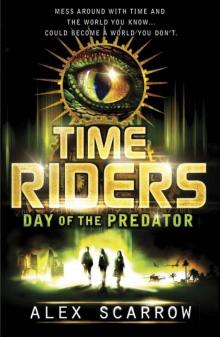 Day of the Predator
Day of the Predator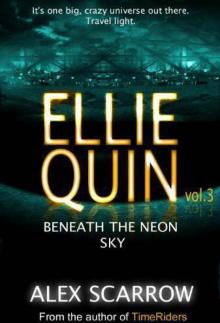 Ellie Quin Book 3: Beneath the Neon Sky
Ellie Quin Book 3: Beneath the Neon Sky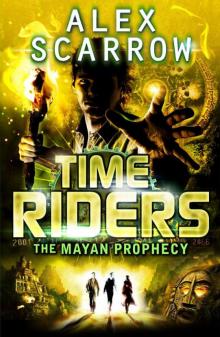 The Mayan Prophecy
The Mayan Prophecy October Skies
October Skies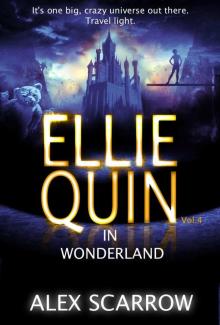 Ellie Quin Episode 4: Ellie Quin in WonderLand (The Ellie Quin Series)
Ellie Quin Episode 4: Ellie Quin in WonderLand (The Ellie Quin Series)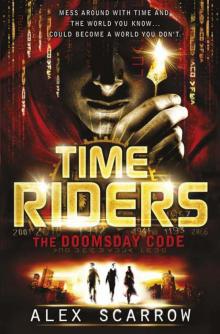 Time Riders
Time Riders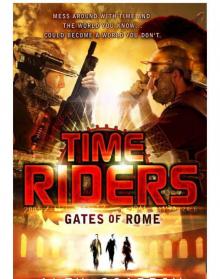 Gates of Rome
Gates of Rome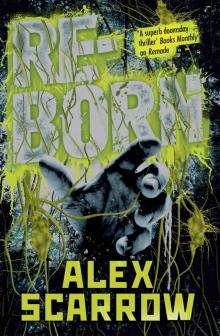 Reborn
Reborn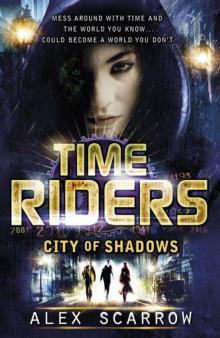 City of Shadows
City of Shadows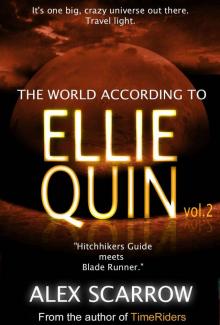 Ellie Quin Book 2: The World According to Ellie Quin (The Ellie Quin Series)
Ellie Quin Book 2: The World According to Ellie Quin (The Ellie Quin Series)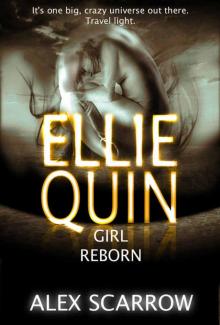 Ellie Quin Episode 5: A Girl Reborn
Ellie Quin Episode 5: A Girl Reborn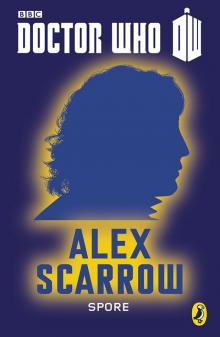 Spore
Spore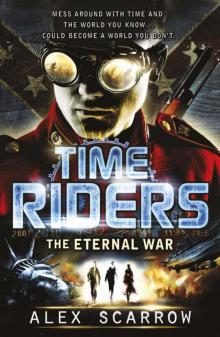 The Eternal War
The Eternal War Last Light
Last Light Remade
Remade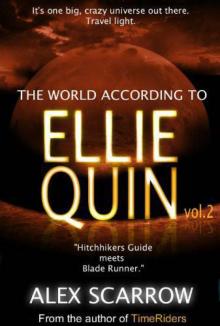 Ellie Quin Book 2: The World According to Ellie Quin
Ellie Quin Book 2: The World According to Ellie Quin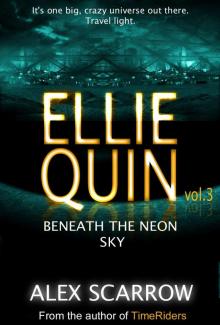 Ellie Quin Book 3: Beneath the Neon Sky (The Ellie Quin Series)
Ellie Quin Book 3: Beneath the Neon Sky (The Ellie Quin Series)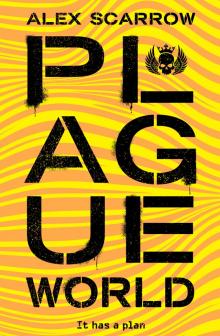 Plague World
Plague World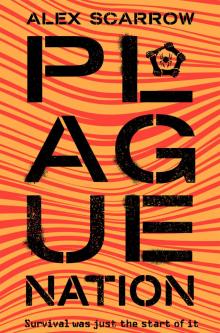 Plague Nation
Plague Nation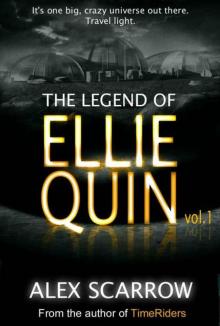 Ellie Quin Book 01: The Legend of Ellie Quin
Ellie Quin Book 01: The Legend of Ellie Quin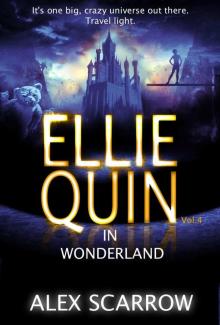 Ellie Quin - 04 - Ellie Quin in WonderLand
Ellie Quin - 04 - Ellie Quin in WonderLand No Escape
No Escape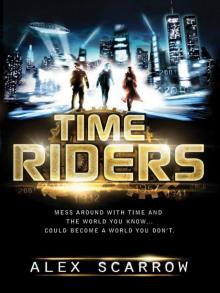 TimeRiders
TimeRiders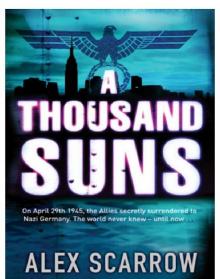 A Thousand Suns
A Thousand Suns The Candle Man
The Candle Man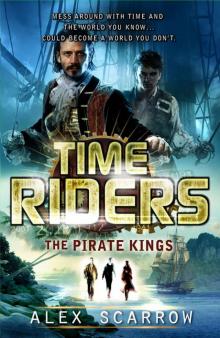 The Pirate Kings
The Pirate Kings Burning Truth: An Edge-0f-The-Seat British Crime Thriller (DCI BOYD CRIME THRILLERS Book3) (DCI BOYD CRIME SERIES)
Burning Truth: An Edge-0f-The-Seat British Crime Thriller (DCI BOYD CRIME THRILLERS Book3) (DCI BOYD CRIME SERIES)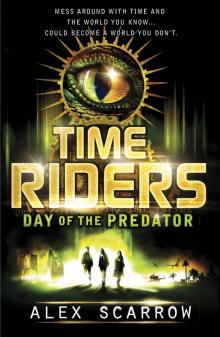 Day of the Predator tr-2
Day of the Predator tr-2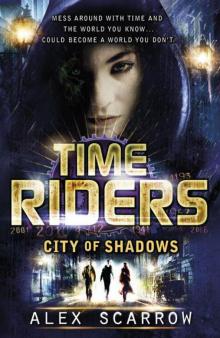 City of Shadows tr-6
City of Shadows tr-6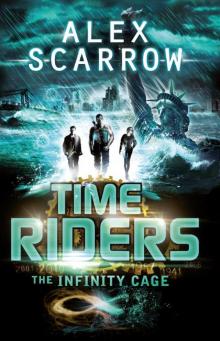 TimeRiders: The Infinity Cage (book 9)
TimeRiders: The Infinity Cage (book 9)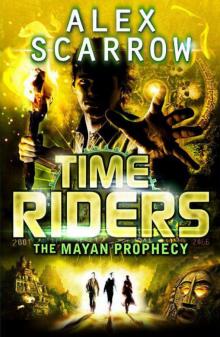 The mayan prophecy (Timeriders # 8)
The mayan prophecy (Timeriders # 8)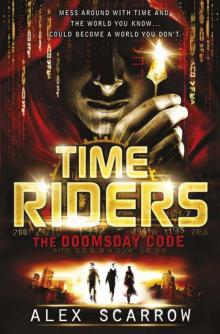 TimeRiders: The Doomsday Code (Book 3)
TimeRiders: The Doomsday Code (Book 3)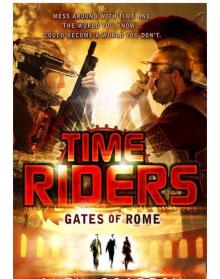 Gates of Rome tr-5
Gates of Rome tr-5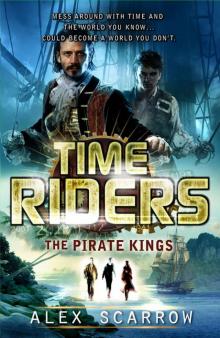 TimeRiders: The Pirate Kings (Book 7)
TimeRiders: The Pirate Kings (Book 7)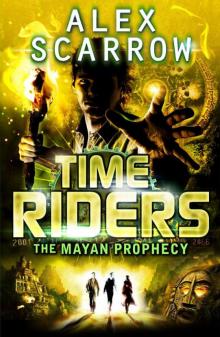 TimeRiders: The Mayan Prophecy (Book 8)
TimeRiders: The Mayan Prophecy (Book 8)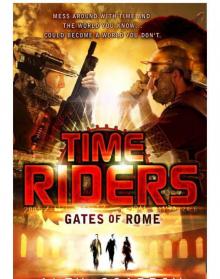 TimeRiders 05 - Gates of Rome
TimeRiders 05 - Gates of Rome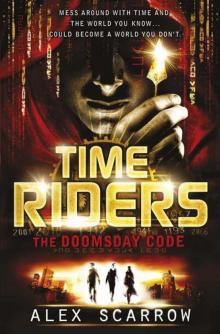 The Doomsday Code tr-3
The Doomsday Code tr-3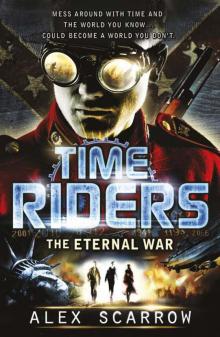 The Eternal War tr-4
The Eternal War tr-4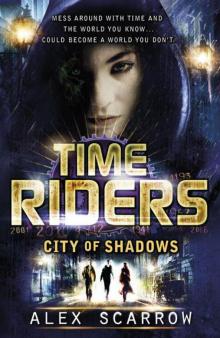 TimeRiders: City of Shadows (Book 6)
TimeRiders: City of Shadows (Book 6)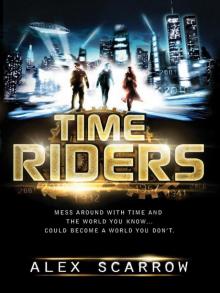 Time Riders tr-1
Time Riders tr-1 Afterlight
Afterlight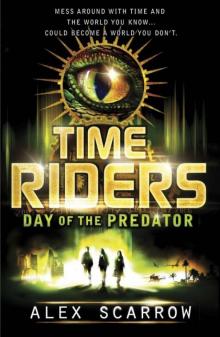 TimeRiders, Day of the Predator
TimeRiders, Day of the Predator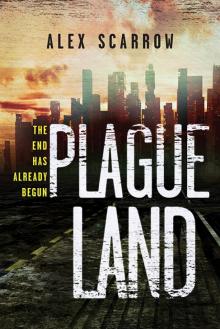 Plague Land Series, Book 1
Plague Land Series, Book 1